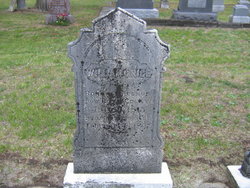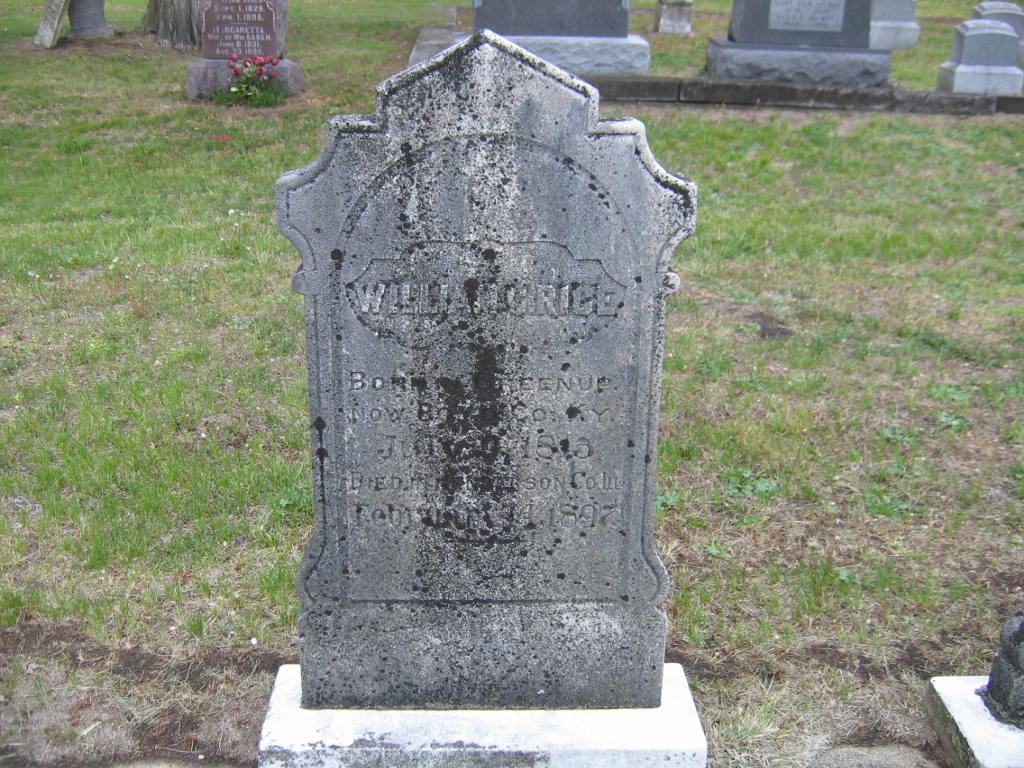Terre Haute (IL) community was platted in 1854 by Wm. C. Rice, deputy county surveyor of Henderson County. The first building, a brick structure, was built in 1854.
William C. Rice was born July 9, 1815, In Greenup county (in 1900, Boyd Co.), Kentucky, whither his parents had moved from their native county of Rockingham, Virginia, about the year 1807. On the banks of the Ohio and big Sandy rivers, his earliest childhood was spent, until the spring of 1820, when (his father having been drowned in the Ohio, in March 1815) his mother removed with her six children to Christian county, Kentucky, by flat-boat on the Ohio, that being the usual and almost the only mode of traveling at that time. Here in Christian county he spent his youth, working on his mother's farm during the summer months, and in the winter attending one of the traditional log cabin school houses, for which kind of educational institution Kentucky and other southwestern states have become famous. Having attended these schools several years, he entered the Hopkinsville, Kentucky, Seminary, at that time under the principalship of James D. Rumsey, the branches of higher mathematics, trigonometry, surveying, etc. About this time the so-called "Illinois fever" struck Kentucky with its full force, and in company with several others he left his native state for the then new country of Illinois, arriving in Warren county (now Henderson) in the spring of 1835, being at that time nineteen years old. After living here about a year, during which time he revisited Kentucky, he spent two years in southern Iowa, (at that time a part of the territory of Wisconsin and known as Van Buren county), occupied in surveying, having obtained from Gen. Henry Dodge, the territorial governor of Wisconsin, an appointment as district surveyor of Van Buren county in December, 1837. Iowa, at that time, was mostly in the possession of the Indians, there being few settlements of white men except those along the river, at Dubuque, Fort Madison, etc., and at Burlington, then the territorial capital of Wisconsin and known as the "Flint Hills." While thus engaged in surveying he became acquainted with the chiefs Black Hawk, Keokuk, and Wapello, the last two of whom lived near the sites of the towns which now bear their names.
In 1838 he returned to Henderson county (then a part of Warren, Illinois, and has lived here ever since. Being elected first county surveyor of Henderson county at its separation from Warren, in April, 1841, he discharged the duties of this office until the winter of the same year, when he went to Macomb, Illinois, where, for the two following winters, he read law in the office of Cyrus Walker, then one of the prominent lawyers of the Illinois and Iowa bars. Having obtained license to practice law in 1843, he returned to Henderson county, and in August of the same year was elected probate justice, and in November, 1849, county judge. Elected by whigs, or "anti-Nebraska" party, he went, in 1854, as the representative of the fortieth district (Henderson and Warren counties) to the legislature, at which Trumbull was elected to the United States senate, over Lincoln and Shields, although Lincoln was really the first choice of the majority of the anti-Nebraska party. Being returned to the legislature in 1858, on the same ticket, he was present at the election of Stephen A. Douglas, over Lincoln, to the senate of the United States.
Upon the expiration of this office he returned to Henderson county and resumed the practice of law, and in 1873 was elected county judge, which office he now (1882) holds, being re-elected in 1877. Politically Judge Rice was always a whig until the practical dissolution of this old party, when he became an anti-Nebraska man, and when the necessities of the times gave birth to the republican party, he, in common with most of the old anti-Nebraska men, joined the new political organization, in which he has always remained constant. In May 1844, he married Mary M., daughter of Cyrus Walker, of Macomb, by whom he had four children, the oldest two of whom died in infancy, and in 1872, his first wife having died in 1871, he married Mrs. Salina Hopkins.
Terre Haute (IL) community was platted in 1854 by Wm. C. Rice, deputy county surveyor of Henderson County. The first building, a brick structure, was built in 1854.
William C. Rice was born July 9, 1815, In Greenup county (in 1900, Boyd Co.), Kentucky, whither his parents had moved from their native county of Rockingham, Virginia, about the year 1807. On the banks of the Ohio and big Sandy rivers, his earliest childhood was spent, until the spring of 1820, when (his father having been drowned in the Ohio, in March 1815) his mother removed with her six children to Christian county, Kentucky, by flat-boat on the Ohio, that being the usual and almost the only mode of traveling at that time. Here in Christian county he spent his youth, working on his mother's farm during the summer months, and in the winter attending one of the traditional log cabin school houses, for which kind of educational institution Kentucky and other southwestern states have become famous. Having attended these schools several years, he entered the Hopkinsville, Kentucky, Seminary, at that time under the principalship of James D. Rumsey, the branches of higher mathematics, trigonometry, surveying, etc. About this time the so-called "Illinois fever" struck Kentucky with its full force, and in company with several others he left his native state for the then new country of Illinois, arriving in Warren county (now Henderson) in the spring of 1835, being at that time nineteen years old. After living here about a year, during which time he revisited Kentucky, he spent two years in southern Iowa, (at that time a part of the territory of Wisconsin and known as Van Buren county), occupied in surveying, having obtained from Gen. Henry Dodge, the territorial governor of Wisconsin, an appointment as district surveyor of Van Buren county in December, 1837. Iowa, at that time, was mostly in the possession of the Indians, there being few settlements of white men except those along the river, at Dubuque, Fort Madison, etc., and at Burlington, then the territorial capital of Wisconsin and known as the "Flint Hills." While thus engaged in surveying he became acquainted with the chiefs Black Hawk, Keokuk, and Wapello, the last two of whom lived near the sites of the towns which now bear their names.
In 1838 he returned to Henderson county (then a part of Warren, Illinois, and has lived here ever since. Being elected first county surveyor of Henderson county at its separation from Warren, in April, 1841, he discharged the duties of this office until the winter of the same year, when he went to Macomb, Illinois, where, for the two following winters, he read law in the office of Cyrus Walker, then one of the prominent lawyers of the Illinois and Iowa bars. Having obtained license to practice law in 1843, he returned to Henderson county, and in August of the same year was elected probate justice, and in November, 1849, county judge. Elected by whigs, or "anti-Nebraska" party, he went, in 1854, as the representative of the fortieth district (Henderson and Warren counties) to the legislature, at which Trumbull was elected to the United States senate, over Lincoln and Shields, although Lincoln was really the first choice of the majority of the anti-Nebraska party. Being returned to the legislature in 1858, on the same ticket, he was present at the election of Stephen A. Douglas, over Lincoln, to the senate of the United States.
Upon the expiration of this office he returned to Henderson county and resumed the practice of law, and in 1873 was elected county judge, which office he now (1882) holds, being re-elected in 1877. Politically Judge Rice was always a whig until the practical dissolution of this old party, when he became an anti-Nebraska man, and when the necessities of the times gave birth to the republican party, he, in common with most of the old anti-Nebraska men, joined the new political organization, in which he has always remained constant. In May 1844, he married Mary M., daughter of Cyrus Walker, of Macomb, by whom he had four children, the oldest two of whom died in infancy, and in 1872, his first wife having died in 1871, he married Mrs. Salina Hopkins.
Inscription
Born in Greenup now Boyd Co.,Ky.
Family Members
Advertisement
Explore more
Sponsored by Ancestry
Advertisement








